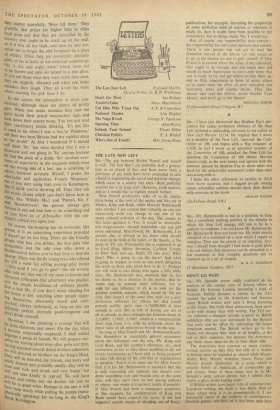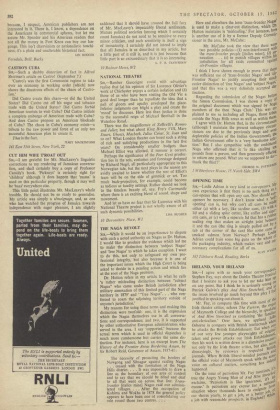DON'T GO WEST
SIR,—Mr. Spender seems oddly confused in his analysis of the current state of literary affairs in Britain. He foresees London becoming a kind of Yeatsian Dublin because a survey in the TLS handed the palm to the Americans and because many British writers now earn a living lecturing in the States. But both these phenomena have more to do with money than with writing. The TLS sur- vey reflected a changed attitude inspired by British publishers who are now dominated by the thought that costs can be offset by cultivating the larger American market. The British writers go to the States, not because they wish to sit humbly at the feet of their superiors, but because the Americans pay them more than we do to hear them talk. The Americans may convene as many creative writing courses as they like, but talk of a decline in Britain must be regarded as absurd while Messrs. Arden, Bolt, Mercer, Osborne, Owen, Pinter and Wesker present themselves on a scene which is notably bereft of Americans of comparable age and stature. None of these chaps may be in Mr. Spender's prep. school eleven, but 1 submit they justify a place in the batting order. If British writers have heard little of contemporary European writing, the fault is less theirs than of those whose duty it is to communicate it. I am personally aware of the richness of contemporary Swedish poetry, but..tittle of it has been seen here
because, I suspect, American publishers are not interested in it. There is, I know, a dependence on the Americans in commercial spheres, but let me assure Mr. Spender and his American readers that not all the money in Fort Knox can buy our lan- guage. This isn't chauvinism or nationalistic touchi- ness; it's a plain and unalterable historical fact.
Ferndale, Brill, Bucks
IAN RODGER















































 Previous page
Previous page